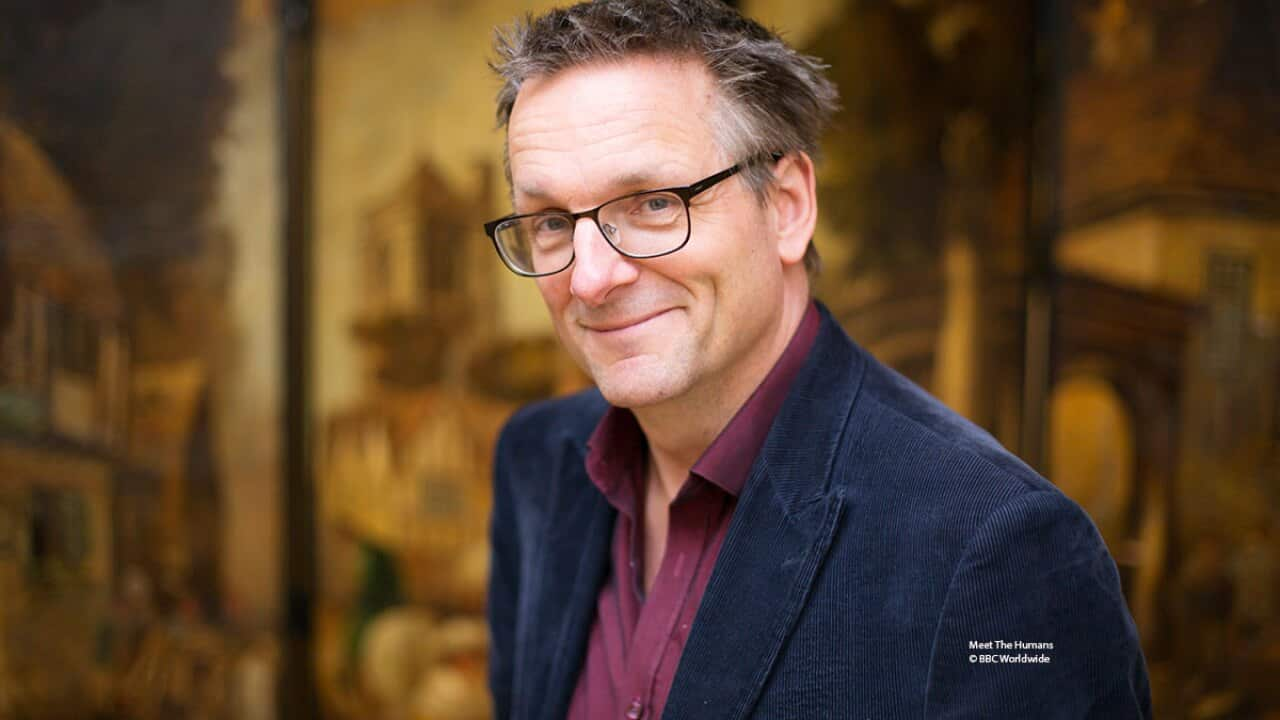Science journalist and documentary presenter, Dr Michael Mosley is one of world's most respected health personalities. In the many years that he's spent exploring what we eat, when we eat and how our diet impacts our gut, brain and weight, Dr Mosley has become a trusted authority on dietary health.
But what does ‘good health’ look and feel like to Dr Mosley once he’s off camera? Does he practise any of the evidence-based recommendations on healthy living that he preaches?
“Personally, what good health means to me is waking up in the morning feeling terrific; going through the day without feeling knackered, and going to sleep late at night feeling that what I’ve done during the day has been worthwhile,” Dr Mosley tells SBS.
There’s lots of evidence that early morning light is particularly good for resetting the internal clock, which in turn sets you up for the day.
The BBC journalist says he’s not immune to the realities of the daily grind but he tries to reduce stress by employing mindfulness techniques and occasionally relaxing with a spot of gardening. He also incorporates exercise into his regular routine, starting the day with strength-based exercises at home – squats and press-ups – followed by a brisk walk with the dog. "There’s lots of evidence that early morning light is particularly good for resetting the internal clock, which in turn sets you up for the day”.
“I also cycle everywhere. I run where I can and I walk up and down stairs. As long as I can do all of those things and still feel reasonably cheerful, that’s what good health feels like.”
What does Dr Mosley eat?
Dr Mosley and his wife, Clare Bailey, are big advocates of the Mediterranean diet because the evidence linking the celebrated diet to positive health outcomes (like a reduced risk of heart disease and weight gain) is strong. So the couple stick to the diet's key principles, filling their diet with lots of good fats, vegetables, fruits and whole foods.
They usually eat a high protein breakfast consisting of eggs and vegetables or smoked salmon. Dinner often features fish and vegetables.
“One of the most important lessons I’ve learned is about the importance of eating lots of olive oil, lots of vegetables and lots of legumes – which is something I’ve never been really fond of (kidney beans, lima beans and lentils). But [we've found] new ways of dishing that stuff up so that you actually like eating it.”
I’m also a fan of intermittent fasting – having longer periods without eating or fewer calories is a good thing.
Lunch is an optional meal for Dr Mosley, as he regularly fasts between breakfast and dinner.
“I try to only eat when I’m genuinely hungry. Before, I used to snack a lot and that turned out to be a pretty bad idea because I started to pile on the weight. Now that I’m over 60, I worry more about my weight, as I know I’m at high risk of diabetes and other stuff like that. So generally at lunchtime, I’m not terribly hungry because I’ve had a good, high protein breakfast and that’s kept me full.
“I’m also a fan of intermittent fasting – having longer periods without eating or fewer calories is a good thing.”
How well does the doctor sleep?
Dr Mosley experiences insomnia. He tells SBS although he goes to bed around 11pm and wakes up about 7am, his sleep quality varies. “My sleep efficiency – the amount of time I’m actually asleep is around 75 per cent. [That means] a quarter of the time I’m in bed, I’m restless and awake.”
That’s why he fronted the camera and became a human guinea pig for the BBC documentary . Dr Mosley participated in an experiment with scientists from Oxford University in 2017 to improve his sleep patterns by targeting his microbiome with a
My sleep efficiency – the amount of time I’m actually asleep is around 75 per cent. [That means] a quarter of the time I’m in bed, I’m restless and awake.
“[In the documentary,] you could see that over the course of five nights, my sleep efficiency improved from 75 per cent to 95 per cent. I wasn’t sleeping any longer but the time I spent in bed I was more likely to be asleep. I felt less tired during the [next] day. The guy from Oxford was blown away as he had only done this [experiment] on rats and I was his first human patient.”
Dr Mosley says the test could reap similar results by replacing a prebiotic fibre supplement with a high fibre diet, “although that could have taken longer [to achieve the same results]”.
He says no to sugary desserts
Late night desserts don't often feature on Dr Mosley's daily menu. He explains that a personalised test revealed that sugary meals consumed just before bed cause his blood sugar levels to spike at night.
“In the morning, [the test results showed that] my blood sugars went up and then it went down…When we did it in the evening, [my blood sugars] went up and just kept on going up for the next three or four hours. So the way your body processes food is very different at night than in the morning.”
Fibre is king.
The key lesson from the combination of the results of these two studies was to watch what you eat at night, before bed. “If you absolutely have to have that sugary treat, you’re better off having it for lunch or breakfast rather than late at night,” he says.
If dessert at night is a must, then eat a healthy dessert consisting of fruits that are full of fibre. “Fibre is king…[Having a good diet] is all about having a variety off foods [to meet your fibre requirements] because your gut is going to appreciate a smorgasbord of foods over an ever-narrowing range of cuisines.”











